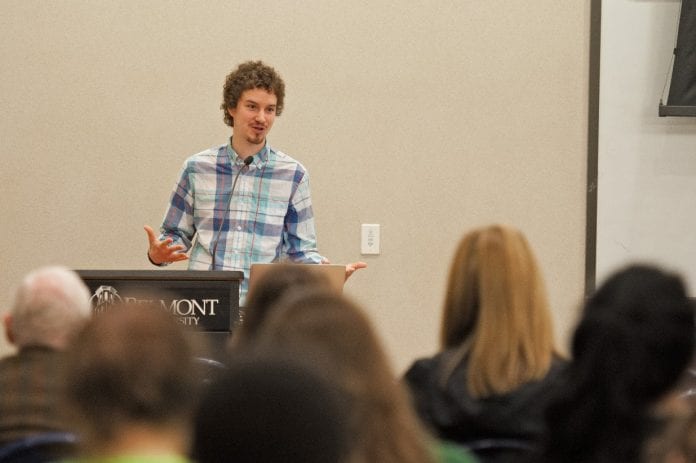Patrick Klepek, senior reporter with gaming news and opinion site Kotaku, kicked off a timely symposium Tuesday focused on internet privacy and social networks. Speaking on the topic “Protecting Yourself in a World without Privacy,” Klepek noted, “The world we live in now is one in which slowly over time we have ceded more and more of our privacy.”
Klepek reiterated throughout his presentation that users need to be more responsible for protecting themselves and their information, starting with creating more demanding passwords. He cited a recent study that showed 10 of the most common passwords, including “12345,” “password” “baseball” and “qwerty.” “All of your passwords are terrible,” he said. “We all know what we probably should be doing with passwords, but we don’t.”
The rise in GPS-enabled applications also can cause privacy issues as it makes location tracking possible, as pointed out by many websites that focus on raising awareness about over sharing of personal information.
Another negative aspect of readily available public information and contact on the internet is the rise in bullying through threatening and often anonymous revelations on social media. “The Internet has allowed escalation of this kind of harassment where you can do a lot of damage without incurring any personal consequences.”
Klepek concluded, “What we want to do is become more consciously aware of what we’re leaving out there and create more barriers for our information. We can’t guarantee anything as there’s only so much you can do, but it’s incumbent on all of us to be aware.”
 Assistant Professor of Public Relations Kevin Trowbridge moderated a student-led panel discussion for the second half of the event, opening the conversation by noting that recent studies indicate that “44 percent of millennials don’t worry about privacy at all” in the digital age. That’s a statistic that needs to change, according to the panelists.
Assistant Professor of Public Relations Kevin Trowbridge moderated a student-led panel discussion for the second half of the event, opening the conversation by noting that recent studies indicate that “44 percent of millennials don’t worry about privacy at all” in the digital age. That’s a statistic that needs to change, according to the panelists.
Senior public relations management major Ryan Bukowski recounted how his parents recently faced an attempted fraud when they opened their computer and saw a bogus message that looked like it was from their service provider. “It said they needed to call a phone number, but when my mom called, a technician was telling how much it would cost to ‘fix’ her computer.”
The four students also emphasized the advantages of social media, particularly in promoting causes and brands.
Senior social entrepreneurship major Kramer Deans said, “Social media presence is a great way to get your name out there… it’s awesome to see how far a message can really go.”
Sophomore public relations major Emily Gainer agreed, noting that “Having a solid foundation online is a good tactic when applying for a job because it sets you apart.”
“You need to have an outlet to express who you are and showcase your skills and abilities,” added junior public relations major Haley Hall. “Having a social media presence is a unique way to do that. You have control of the image you send out to everyone, whether it be potential employers or friends and families. It’s important to create that image.”



